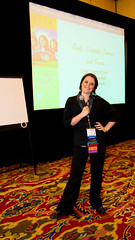 Gail Carmichael hit upon the idea of doing a 1 week course on games for girls when her university was soliciting proposals for "enrichment mini courses." These courses are largely attended by grade 8s (~13 year olds), typically the advanced students from the local schools. They're intended to give the students a one-week taste of the university environment. If you are interested in running such a program, Gail suggests that there are often similar programs in other cities, local summer camps, local WISE groups, the Girl Guides/Girl Scouts and many others who could help set something up.
Gail Carmichael hit upon the idea of doing a 1 week course on games for girls when her university was soliciting proposals for "enrichment mini courses." These courses are largely attended by grade 8s (~13 year olds), typically the advanced students from the local schools. They're intended to give the students a one-week taste of the university environment. If you are interested in running such a program, Gail suggests that there are often similar programs in other cities, local summer camps, local WISE groups, the Girl Guides/Girl Scouts and many others who could help set something up.The idea was to do a "head fake" -- get the girls excited about learning games, but manage to teach them computer science topics at the same time. The students seemed to crave the harder stuff, and really were excited about being told things like "they don't learn this until second year university!" once the girls had shown that they understood this difficult concept. Gail suggests that we shouldn't be afraid to give students complex concepts.
She notes that another thing the girls craved is Starbucks coffee... who knew?
When teaching younger students, variety seems to help a lot: Gail incorporates videos, lecture time, small groups, whole class discussions, lab time, and the activities from CS Unplugged.
It's interesting to note that Gail's advice for engaging younger students is very similar to the advice offered during the Best Practices for Introductory Computer Science session, which focused on university-aged students: get the students to work together, use interesting themes to motivate problems, and don't be afraid to give the students hard stuff.
The girls created games using the free tool GameMaker, chosen because it is relatively easy for the girls to make games from the drag-and-drop interface without learning programming. (As someone else who has taught students both with and without this interface, I'll add that for first year students, syntax errors can be a huge stumbling block. Tools like GameMaker allow them to create programs without typos making them frequently feel stupid and inadequate, which is a pretty huge advantage for beginners.) Some other (similar) game-creation tools that might be useful include Alice, Kodu, and Scratch.
So, how successful was it? Gail has run the course twice, and did informal surveys at the beginning and end of the course. Most of the girls thought computer science was a reasonable career for a woman, even before they took the course. This is perhaps not surprising, since they were at least interested enough to sign up for the course. But the real payoff was seeing that the girls really did like computer science more after having had a week to try it out.
Gail ended up having the entire hour to herself, since the second speaker, Anne Marie Agnelli, was unable to attend. This gave an opportunity for Gail to showcase one of the games created by her students, as well as have a longer question/discussion section. In fact, the second half of the presentation became much more like a Birds of a Feather session where a variety of women talked about their questions and experiences.
For more notes, including those from the question session, and links to Gail's course materials and slides, see the excellent notes on the girls and games session on the Anita Borg Institute Wiki.


1 comment:
I love it! I manage a computer camp with iD Tech Camp and really enjoy seeing more girls getting into computer science. There is a wonderful (and necessary) shift, probably thanks in a large part to the popularity of gaming!
So all you young ladies, please come to iD Tech at UVa or William and Mary! Virginia camp
Post a Comment